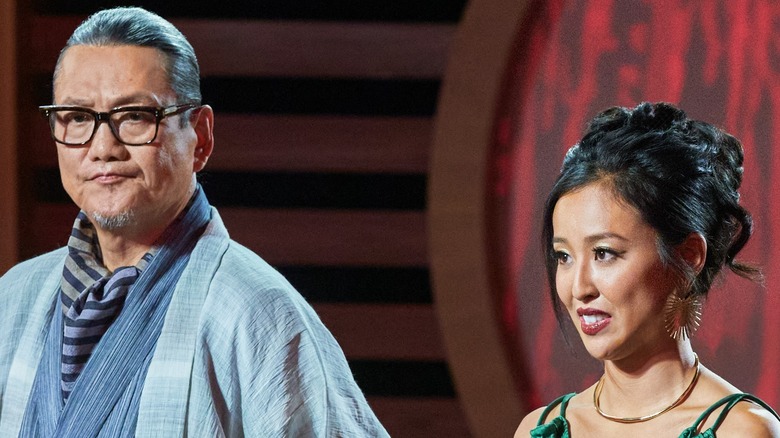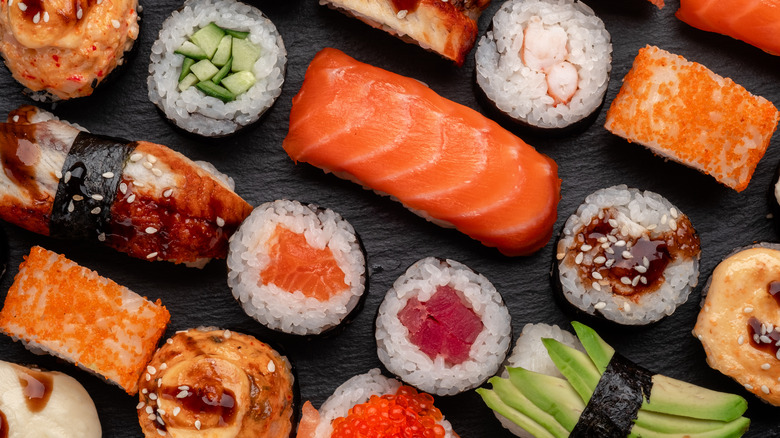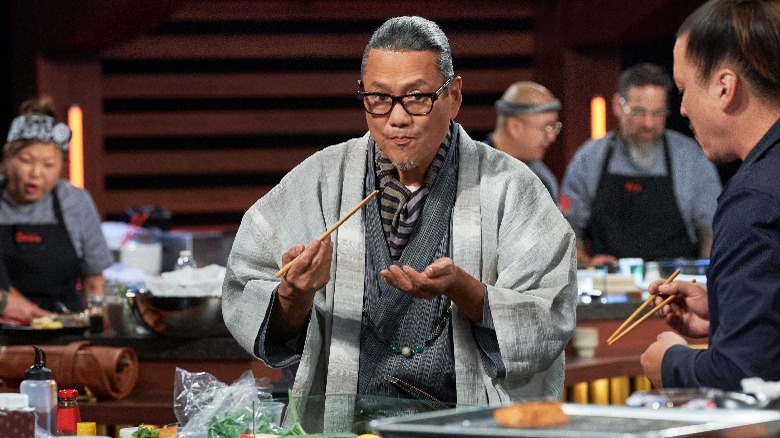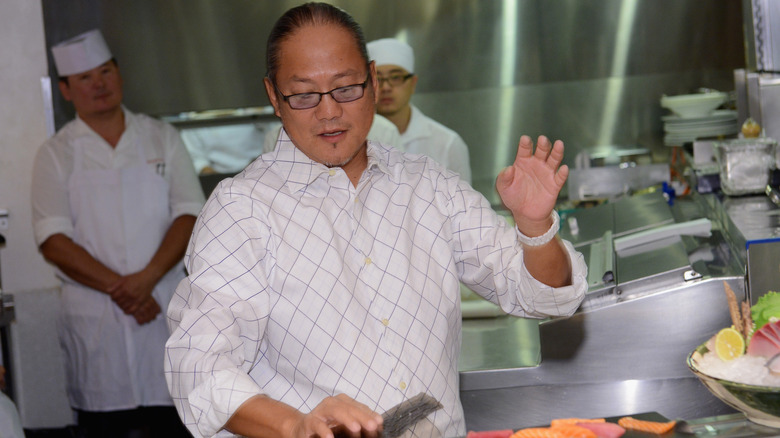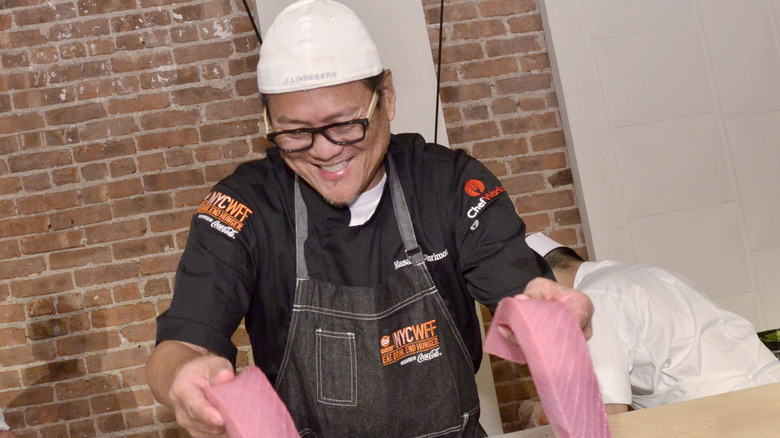Chef Morimoto And Lyrica Okano Taught Us How To Be A Sushi Master - Exclusive Interview
The sushi rules Masaharu Morimoto could lay down for you might make you question whether you've had an authentic version of the dish in your life. Did you know (as the chef once told Laughing Place) that sushi is traditionally a hand — not a chopstick — food? Have you ever eaten sushi with cold rice? You've done so at the cost of sweetness and layers of flavor. Then again, if that's the sushi that makes your taste buds tingle, you do you.
Chef Morimoto will tell you the same — go ahead and go Wild West on sushi canon if you want to, as long as you know the rules you're breaking first. You've watched the legend on "Iron Chef," "Iron Chef America," "MasterChef," "Top Chef," and maybe even "Hawaii Five-0." You're about to accompany him as he judges eight chefs in their attempts to prepare ingenious takes on sushi and other Japanese dishes for $25,000 and the glory of a "Sushi Master" title.
On "Morimoto's Sushi Master," Morimoto — accompanied by judges Kenji López-Alt and Dakota Weiss, and the host, Marvel actress Lyrica Okano — is both painfully honest with contestants and mildly ludicrous. Contestants are simultaneously fiercely competitive and BFFs. The resulting competition atmosphere is what might happen if "The Great British Baking Show" and "Hell's Kitchen" had a baby. In celebration of it, Mashed sat down with Chef Morimoto and Lyrica Okano to dig into sushi wisdom and uncover a single unbreakable sushi rule.
The most important ingredient in sushi, according to Chef Morimoto
In the first episode, we hear you say that "sushi has a lot of rules, and let's break them." That said, is there a rule we should never break?
Masaharu Morimoto: You should not maybe be breaking rules in theory, but actually, you're better off breaking rules. As a beginner, you still don't know what kind of rules we have, or that Japanese history has; that's why we have the first episode introducing the program. Maybe you watch that and then you can choose, or you can learn. You can decide, "I don't have to do any [of those things]," or, "Let's break this down; maybe we can make it more easily." That's what these Japanese restaurants have done.
What do you think? You watched the whole thing; you understand that actually, no — we have no rules. Customers are king, as long as they pay.
Lyrica Okano: Chef, I've got a question for you. Imagine if they made perfect sushi, but the rice is too hard. That's a no-no, right? That's a rule that we don't want to break. We don't want to make not-so-great rice, because there's no good way to make great sushi if the rice sucks.
Morimoto: Great sushi has great rice. The rice is more important than the fish.
Contestants on the show had a hard time properly seasoning their rice, especially in the first episode. Why is it so hard to season? Can you give us your top tip for seasoning sushi rice?
Morimoto: That's easy. You can make the right rice — buy a Japanese rice cooker.
Okano: Get a rice cooker. Buy it!
Morimoto: The way you make the rice is easy. If you feel like a sweet sushi rice, you put more sugar in it. If you want more salt, more sour [profiles], anything you want ... it depends.
What's your favorite mix of seasoning to put in sushi rice?
Morimoto: That's only three things: vinegar, sugar, and salt. I give it four [parts] vinegar, then two sugar and one salt — four, two, one.
Chef Morimoto tells us how to order sushi at a restaurant
Chef Morimoto, can you describe your personal perfect sushi order?
Morimoto: I don't go to sushi restaurants much, but when I go to a sushi restaurant, I start by checking the restaurant and then checking the sushi man's skill. The first [thing I order] is Tekka Maki, a tuna roll with seaweed on the outside.
Okano: That's the first roll?
Morimoto: Yes. That requires a very basic technique. Then, give me miso soup.
Okano: Right, the basics.
Morimoto: Give me the right treatment of dashi stock. Yes or no, are there chemical things — MSG? That tells me, what kind of level is this sushi restaurant? What kind of level is this sushi chef? Then, after answering those questions at this restaurant, I can order.
What's the top sign that you're at your restaurant with a really talented sushi chef?
Morimoto: What a talented sushi chef has to ask themselves is, "Okay, am I great? This is my skill. This is my dish." It's not that traditional. After being introduced to Japanese food, you can decide, "Okay, I like this over this" ... Or last time, you made that, so how about this time, you make this? Then maybe you can try going bigger and bigger. That is how I think a sushi chef is a talented chef.
I worked in Japan in a very high-end restaurant for around 20 years. I make it right, so I might say, "No, no, no. Don't do this; you have to do this ..." But it's not the United States. I'm here in Jakarta, Indonesia. Every single city in a country is different. New York is New York. Los Angeles is Los Angeles, Moscow is Moscow, London, Rio de Janeiro, Paris, Rome ... All have to do local sushi and provide for their own industry, culture, history, and people. We have to respect that, but unfortunately, most Japanese people don't trust those things. They think sushi is Japan — it's what we do here. Even ... I am Japanese, and I'm doing my own sushi style in New York. Japanese people are going "Oh, this is original. This is original sushi."
Okano: It's different.
Morimoto: It's different. But it should be different. Around the world, people speak languages that are different, faces are different, skin color is different, everything is different — history, educational background. All also have to make their own Japanese-style sushi or sashimi Japanese cuisine ... That's it. You should make your own rules.
Okano: It is not about how talented or how amazing a chef is at making their own sushi, it's about hospitality. It's about giving what the customers want and paying attention to their needs. That is what makes a true sushi chef.
Chef Morimoto's top tip for maki enthusiasts
Lyrica, what is the top thing that you learned from Chef Morimoto, working with him on this show?
Okano: I know so much about sushi, all thanks to Chef Morimoto. He's a master, but what I took away most is about how important it is to love and enjoy what you do. I'm no chef; I'm not part of the culinary universe. But I can say from acting — being a creative person — that it is so important to remember that, because all of that can go away. You're stressed out, you got a lot of work to do, you've got a lot of pressure on your shoulders, and you forget the fun. But Chef is about to open his 21st restaurant across the world, yet he still loves what he does and still has so much fun doing it for his customers. That's what I admire the most and learned the most from Chef.
Chef Morimoto, you said one of your top goals for the show was to bring sushi into our home kitchens and to make a sushi-rolling party the same as a backyard barbecue. Can you give us any special techniques for rolling maki if we're going to do it at home?
Morimoto: You should buy seaweed, you should cook the rice, and then what we'll need is seasoning, like vinegar and soy sauce and sugar. Don't even think about it so much. Seaweed, rice roll, then do it one by one ... Of course, we are professionals, so we roll quickly — bam, bam, bam. But you can do it slowly, one by one. You're making it for your family and the kids and relatives, and friends, and the neighbors. They enjoy the sushi, little by little. Next, a couple of weeks later, let's do better than last time.
Try this: "Last time I spent five minutes rolling sushi; let's do it in three minutes this time." Don't even think about it too much — it's nothing. If you don't like to roll rolls like this [using a mat], you can do hand rolls, like an ice cream cone. Whatever your flavor preferences — maybe add sausages, pickles, and mushrooms; maybe tuna, smoked salmon, or anything else you can buy ... Then add wasabi, scallions, and any spices, and then make your roll.
How to pick the right tuna for sushi, according to Chef Morimoto
If we are looking for tuna to make a tuna roll at home — because tuna comes up a lot as an ingredient in the show — what are the signs that we should be looking for when buying fresh tuna for a sushi roll?
Morimoto: Fresh means fresh. Fresh does not mean raw. I would like some TV show to explain. Costco has sashimi frozen in packages — in their package, they have sashimi, tuna, and salmon; there is rice, wasabi, and ginger in the package. This is frozen, but it's still fresh. You can try those ones too. Where do you live?
Right now, I am in Medellín, Colombia.
Morimoto: Colombia! Such difficulty finding an Asian store market there.
There are a couple.
Okano: What if [the tuna] is too dark red?
Morimoto: Tuna has a body temperature that is much higher than a human being has. If it is not fresh, the color is not red — it's brown or darker. Because when they're hooked, they burn, like meat, because of their own temperature, from the inside out. Right after you catch the fish, cut off the head, then take out the guts and put it in ice water immediately. Then their temperature goes down. But still, after they're frozen and are defrosting, you can tell if they were left out a long time ... it's changing color — red, brown, and darker blood-colored. And of course, beware of smell.
Okano: You can tell by the smell too. Avoid super dark, browning, red tuna that smells super fishy. That's probably not the best.
Morimoto: In Colombia, the best thing is to have sushi chef friends. Ask them, "Can you buy fresh tuna for me? Because I have a party next week." That's the best way in Colombia. In Los Angeles, there's an Asian market on every single corner.
Chef Morimoto, when contestants leave the show, you give them a proverb to leave by and to live with. Could you give us a proverb — and maybe Lyrica, could you translate — to guide us watching the show?
Okano: We actually had a real translator on the show who helped translate the proverbs, but I'm going to try. Be very nice, Chef.
Morimoto: 負けるが勝ち [makeru ga kachi]
Okano: "Sometimes your losses can lead up to wins" ... Your losses can lead to wins, y'all! It's not always about the wins; sometimes you have got to lose some to win some.
Pick up more sushi tips from Chef Morimoto on Chef Morimoto's "Sushi Master," which you can stream for free on The Roku Channel starting June 16.
This interview has been edited for clarity.
